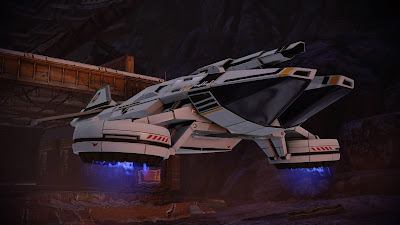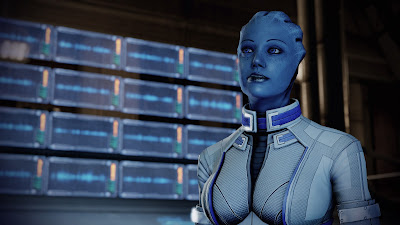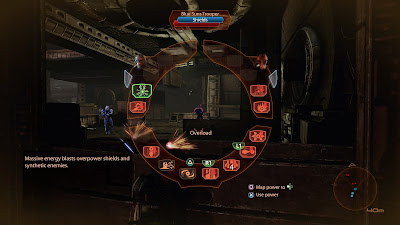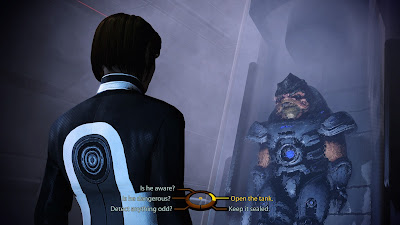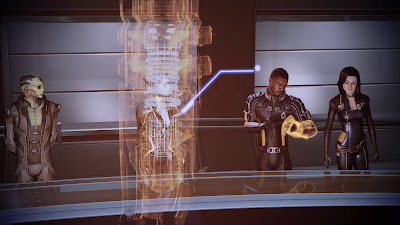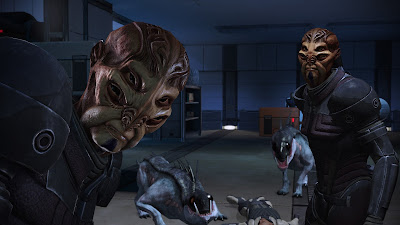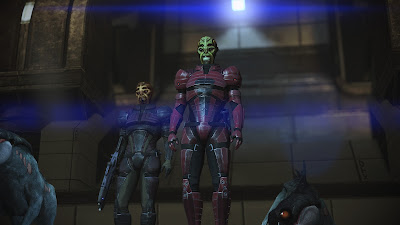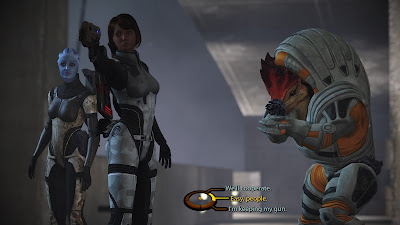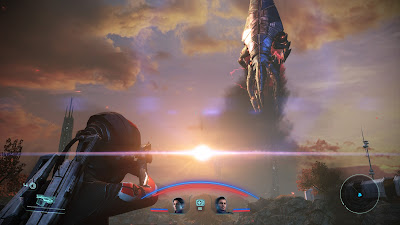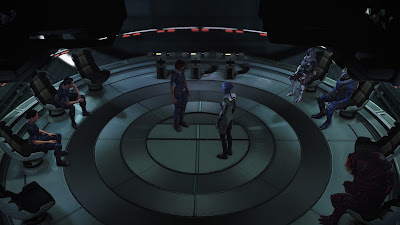Original Release: Mar. 6, 2012 for XBox 360, PC. Playstation 3. Version Reviewed: PS4 Legendary Edition, 2021.
THE PLOT:
The day Commander Shepard has warned about has finally come: The Reapers have invaded. They first hit Batarian space, turning the survivors of the race that had been the scourge of the galaxy into scattered refugees. Their next target is Earth, and it isn't long before the massive enemy ships descend upon humanity's homeworld.
After months in prison for working with Cerberus to stop The Collectors, Shepard is now restored to a leadership role and given an impossible mission: Unite the other Council races, with all their grudges and prejudices and rivalries, into one massive force against the Reapers!
 |
| Getting the band back together: Shepard reunites with old squadmates. The ones who are still alive, at least. |
CHARACTERS:
Commander Shepard: As with the first two games, the main direction of Shepard's journey is fixed. Within those boundaries, however, gamers again have freedom to shape the commander's personality. Shepard can be an inspiring hero, or angry and bitter, or worn down with exhaustion... or pretty much any combination. I started my Shepard with mainly "Paragon" speech options; then, as stress began taking its toll, I started to opt for more short-tempered "Renegade" options. This worked well... but it's far from the only option available.
Liara T'Soni: Mass Effect 2 greatly improved her characterization (along with most of the rest of the ensemble). Its Lair of the Shadow Broker DLC overhauled her role in the series, and that plays a big part here. Liara is strongly supportive of Shepard, with several scenes that gain added resonance if she's the selected love interest. Shepard is forced by circumstances to play politics, but it's an uncomfortable fit; Liara, who was born to that environment, is often able to assist. Her enthusiasm for the long-extinct Protheans remains as well, prompting some choice interactions with DLC character Javik.
Kaidan/Ashley: The survivor of the first game's Virmire mission returns in a substantial supporting part. Refreshingly, though both Kaidan and Ashley fill the same role in the story, much of their dialogue is different. Kaidan talks about his students; Ashley worries about her family. Both cling to suspicions about Shepard's past ties to Cerberus, with voice actor Raphael Sbarge again making his resentment of that choice feel like something personal. I prefer Kaidan's scenes overall, but it's worth playing both versions.
James Vega: Is introduced as a hothead, arguing with Shepard over the choice to leave Earth, but he's also a generally decent guy. Unlike Mass Effect 2's Jacob, this is conveyed not by having people talking about how nice he is, but rather through his interactions: with Shepard, with the crew, and with shuttle pilot Steve Cortez. Voice actor Freddie Prinze Jr. proves a deft hand at comedy (ask James to do something techie on one of the Rannoch missions - the results are gold), but he also can dial that back to convey more serious emotions. Against my expectations, I ended up liking Vega a lot. It's a low bar, but I think he wins the award for "Best Human Squadmate" across the trilogy.
Samantha Traynor: Mass Effect 3 features what I believe was a Bioware first: two exclusively same-sex romance options. Unsurprisingly, the woman gets far more characterization. The good news is: She's a delight. Samantha Traynor, the Normandy's new Comm Specialist, is not someone who ever expected to be near combat. She's a tech nerd: hygiene-obsessed (with a very expensive toothbrush), a bit of a hypochondriac, and a chess and games enthusiast. Voice actress Alix Wilton Regan brings her wonderfully to life, and the character comes across as effortlessly likable.
Steve Cortez: The male same-sex counterpart is Shepard's shuttle pilot, and he basically has three traits: his longtime friendship with Vega, his piloting, and the death of his husband to the Collectors. Some of his interactions with James are amusing, and the Citadel DLC fleshes him out with a few more varied interactions. But there's a spark that Traynor has (and Mordin, and Wrex, and Garrus, and Tali, and... well, all the characters who really work) - and that spark just isn't there with Steve. I liked him just fine - but I'd be lying if I said I never pressed the "skip" button during his conversations.
Returning Characters: Garrus and Tali get interactions with Shepard and with each other that are a joy to watch. Tali's role builds on her loyalty mission in Mass Effect 2, with her position among the Quarians potentially very different depending on the results of that mission. Garrus's adventures with Shepard have made him the Turians' expert on Reapers. Artificial Intelligence EDI gets an expanded role - one which, on first playthrough, I was initially concerned would fall flat, but which ends up working well within the story. Wrex, Mordin, Thane, Legion, and Miranda don't re-join the crew, but they get decent supporting roles - particularly Mordin, who is at the center of the story's strongest arc.
Not all characters are equally well-treated. It's little surprise that Kasumi and Zaeed only receive cameos, as they were optional DLC characters in the first place. However, fan favorite Grunt is only seen in one mission; the same is true of Samara; the same is true of Jacob. The "Citadel" DLC makes up for this to an extent. In the core game, though, many previous "regulars" barely end up qualifying as walk-ons.
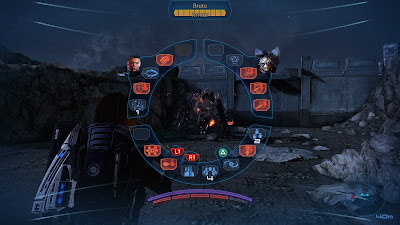 |
| Shepard is charged by a Reaper creation known as a Brute. |
COMBAT:
The combat in Mass Effect 3 is mechanically similar to the combat in Mass Effect 2 - which, as I noted, I didn't much enjoy. It's been tweaked, however. Controls are more responsive, and it's much more enjoyable as a result.
Darting from one piece of cover to the next is now keyed into button presses and direction controls, rather than having to be done manually each time. When in cover, you can also perform "quick kills" of enemies directly next to you. There's also an enjoyably overpowered feature: In battles involving Cerberus mechs, you can snipe the mech's pilot and hijack the machine, which will transform a tough battle into a one-sided slaughter.
In short, with just a few modifications, a combat system I gritted my teeth through in the previous game has been transformed into an absolute joy.
ADDITIONAL GAMEPLAY:
Mass Effect 3 pares back some of the dialogue options. In many cases, particularly when talking to the characters on the Normandy, no dialogue wheel appears; instead, the NPC will give a scripted comment about events. Full dialogue options are only presented for major interactions, rather than every time.
I have mixed feelings about this. On the one hand, doing the Normandy "rounds" in between missions is much quicker and easier. I do not miss clicking through the same responses over and over again just to find out if a given character has anything new to say. However, it also means that when a full conversation does become available, you pretty much have to have it then or lose it forever.
The planet scanning that was everybody's favorite (sarcasm) part of Mass Effect 2 returns. Fortunately, it's a lot less cumbersome. Instead of mining for resources, you are searching for a single target area, usually to fulfill a fetch quest received on the Citadel. There's also an element of jeopardy introduced, as Reapers will "detect" your scans and come after you... though it must be said that, for Lovecraftian dark gods, they are amazingly slow. If you want to see the Reaper "game over," you pretty much have to stop the ship to let them catch you!
 |
| Wrex and Mordin prepare for the Battle of Tuchanka... unless either or both died in the first two games. |
DEALING WITH PAST DECISIONS:
Mass Effect 2 already had to prepare variations of certain scenes to address some of the choices and events in the first Mass Effect. Depending on what was chosen and/or which characters survived, Shepard would encounter either Kaidan or Ashley on Horizon and either Wrex or his vicious borther Wreav on Tuchanka, resulting in differences in the scenes set on those worlds.
Mass Effect 3 continues this, but on a much larger scale. Instead of a cameo, Kaidan/Ashley gets a major supporting role. Wrex/Wreav also has a substantial role, and these two characters couldn't be more different. Wrex wants the Krogan to be a part of galactic society; Wreav wants revenge for wrongs perpetrated on his people. Given the implications of their respective outlooks, you might entirely reconsider one major choice if Wreav leads the Krogan instead of Wrex... and you might well be right do so!
Any of Mass Effect 2's squadmates could die at the end of that game. That leaves Mass Effect 3 to come up with two variations for eleven different characters. This is comparatively simple for those who only receive cameos: The mission in which they appear plays out either with an NPC stand-in or just without that character.
Other replacements are more significant. If Mordin died in Mass Effect 2, then Padok Wiks, another Salarian scientist, takes his place. It's well worth doing a playthrough to see this variant, as Padok is an excellent character in his own right. He fills Mordin's role in the story, but he is very much his own man. He's less humorous and is also less of a pragmatist. Mordin defended the genophage as a necessary evil; Padok considers it a wrong, insisting that every species has value. Mordin develops a friendship with the female Krogan, Eve; Padok and Eve have "an agreement not to kill each other."
If Tali died in the Suicide Mission, then her role in the Rannoch campaign is filled by the Quarian admirals. This takes one potential resolution to the conflict completely off the table. In addition, it creates a noticeably darker atmosphere. Without Tali, there is no Quarian whom Shepard can fully trust.
 |
| Shepard struggles toward the Reaper skybeam. Because you can't have an apocalypse without a skybeam. |
AN UNWORTHY ENDING:
When Mass Effect 3 was first released, it didn't take long for the discussion to focus on one aspect: the ending. Particularly in its original form, the ending was... really, really bad. So bad that within weeks, Bioware released a free "Extended Cut" DLC that patched it with multiple improvements - which has not stopped it from becoming one of the most infamous endings in video game history!
You'd just about have to try to play the ending in its original form anymore, so I'll briefly describe it. Fear not; there are no meaningful spoilers. Shepard makes the game's final decision, whose momentous consequence is... What color explosion happens: Red, green, or blue. This is followed by a brief, wordless scene in which Joker and another character will climb out of a crashed Normandy to stare pensively into the distance. Roll credits!
In its patched form (the only one available on the Legendary Edition re-release), I wouldn't label it a disaster. The focus of the decision ties in with a recurring theme of the trilogy, one that's particularly relevant in the third game. More context is given to the final choice, with more dialogue options for Shepard. There is also an epilogue that shows the effects of Shepard's choice, making use of the individual decisions you made prior to that point, allowing for: which characters and races survived; various power dynamics, from whether a bomb was stopped to whether a peace agreement was reached; how successful Shepard was at accumulating war assets; and whether Shepard followed a Paragon or Renegade path. There's even a stealth fourth option.
Had this care been taken in the first place, I suspect much of the outcry would never have happened. That said... Even in its current form, Mass Effect 3's ending is its single weakest aspect. It doesn't nullify the roughly fifty hours of very good story and gameplay that precedes it. Still, you tend to remember the final impression left by a book, movie, or game - and Mass Effect 3 does not leave a very good final impression.
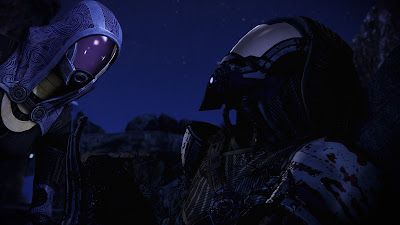 |
| Tali pays her respects to a fellow Quarian who reached his homeworld, only to die in battle. |
OTHER MUSINGS:
Despite that weak ending, Mass Effect 3 is still my personal favorite of the trilogy. It has the best combat. It features several of the best character interactions, including some of the most emotional moments in the series. It delivers an effective sense of dread that builds steadily and is felt even during the humorous moments.
The use of the Citadel is more or less what Dragon Age 2's Kirkwall should have been, in that it changes throughout. Early in the game, C-Sec Commander Bailey complains that people keep behaving as if everything is normal and there is no war. Each return sees the Citadel's situation deteriorating. The hospital goes from clean and mostly empty to so busy that patients are on stretchers in the halls. A holding area is assigned for refugees from overrun worlds, and it grows increasingly crowded. Background conversations show people first becoming aware of the war - and then becoming afraid.
Then there are the background conversations, which provide miniature narratives. A human soldier, disowned by her family after marrying an Asari, desperately tries to get her daughter to her spouse's family on Thessia before she ships out. A Volus merchant bloviates to a naive human woman about his certainty that the supposedly safe colony world of Sanctuary is a giant scam. An Asari commando grapples with memories of a Reaper attack on a world she was evacuating. A young refugee forms a bond with a Turian guard while waiting, with increasing hopelessness, for her family to arrive. And many others, ranging from amusing to touching to horrifying.
Not all of these vignettes work. The conversations between a military wife and her Asari lover, who urges her to leave her husband while he's on the front lines, mainly left me wanting to show both ladies to the nearest airlock, for example. Still, these background stories combine to create a mosaic of the war's impact on people whom Shepard would otherwise never meet.
 |
| An Asari falls to a Reaper creation, in an image straight out of a horror movie. |
A FEW SIGNS OF RUSHED DEVELOPMENT:
I have no substantial complaints about the first two thirds. Not every mission is equally well designed, but that's been true of every game in the series. Up through the Rannoch arc, the story is well structured. There's a nice sense of rising action, with Shepard gradually gathering allies and notching a few big victories - but always at a cost, which helps sustain the grim tone even when calling down an air strike on a Reaper. There's a mix of shorter missions and more extensive mini-campaigns. There's a sense that the story is building the way that it should.
As the story approaches its later stages, the tight deadline starts to show. A key part of the late story brings Shepard to Thessia, the homeworld of the Asari, who are the most advanced civilization and who have been one of the most prominent alien races throughout the series. You would expect an arc of missions, as happened with the Krogan on Tuchanka and the Quarians on Rannoch. Failing that, you would at least expect an extensive, multi-stage mission with multiple dialogue breaks to absorb different facets of Asari culture - as, again, happens with both Tuchanka and Rannoch.
Nope. Thessia is one of the shortest and most linear missions of the game. Shepard takes a short walk across a bridge, down a ladder, and up a corridor, fighting routine enemies along the way. There are some good observations and interactions at the destination (particularly if you bring Javik) - but it's far from enough to disguise how rushed the entire sequence is. Both the revelations and the emotional follow-up would have meant far more had it been more of a fight to get there. I strongly suspect this was a case of the deadline forcing the developers to create something shorter and simpler than was ideal.
Earlier, I discussed how well this game does in "catching" most of Shepard's potential decisions. There are a couple of exceptions. Players who picked Morinth over Samara in Mass Effect 2 are treated to... zero alternative Morinth scenes or interactions. All that happens is that Shepard receives one email early in the game, before eventually running into a standard enemy labeled "Morinth." Something similar happens if Legion was sent back to Cerberus. It's disappointing, as I suspect interesting variations could have been created. However, in both cases, the percentage of players making those choices was probably extremely small. As the deadline loomed, I expect that more fully addressing those routes was sacrificed to making sure that alternate paths for Tuchanka, the Citadel, and Rannoch were properly available.
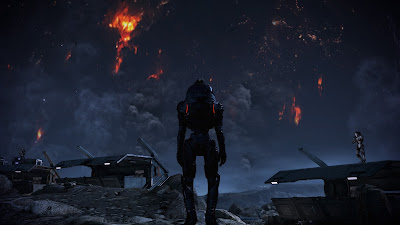 |
| A Turian watches helplessly as his planet burns. |
OVERALL:
Yes, the ending is weak, even if its current form isn't the disaster of the original release. Yes, the developers should have had a three-year development cycle, as with Mass Effect 2, rather than being forced to squeeze the series' most ambitious title out in a mere two years; and yes, that deadline starts to show in the later stretches.
For all of that, I mostly love Mass Effect 3. I love the character interactions. I love the background conversations. I love the fact that, even if your past choices have minimal effect on the ending, they are addressed through noticeable variations throughout the game.
If the ending wasn't so wobbly, this would get full marks even with the other issues. Even as it stands... This is my favorite game in my favorite video game series. There's no question that I'm rating it highly.
Overall Rating: 9/10.
Mass Effect 3 DLC
Previous: Mass Effect 2
Next: Mass Effect - Andromeda
Review Index
To receive new review updates, follow me:
On BlueSky:
On Threads:






